blog
Interview with photographer Erika Morillo

Coney Island train station, 2014 © Erika Morillo
Erika Morillo is a freelance artist and educator based in New York City, who was born and raised in the Dominican Republic. She uses photography as a way to explore and understand her family dynamics and the social environment she inhabits. Her work focuses on the issues of family, the finding of identity, and exploring the photobook as art object.
In our conversation, we covered a range of ideas and subjects. Her Coney Island project, and her images featured in F-Stop Magazine’s August-September exhibition Vacation, are examples of how she uses photography to explore “ways to understand my own experience and see myself and my role as a mother, which evolved to how I see myself in this new world that I was part of. Very organically I went from photographing at home to photograph my life in the city. You are exposed to such an intense life in New York City, and that really connected me to such a joy of image making.” She added that Coney Island, for example, feels very unspoiled, non-gentrified, and a place where people from all walks of life come together. “It’s loud, it’s very picturesque, it’s chaotic at times, and being on the ocean reminded me of my own roots in the Dominican Republic.”
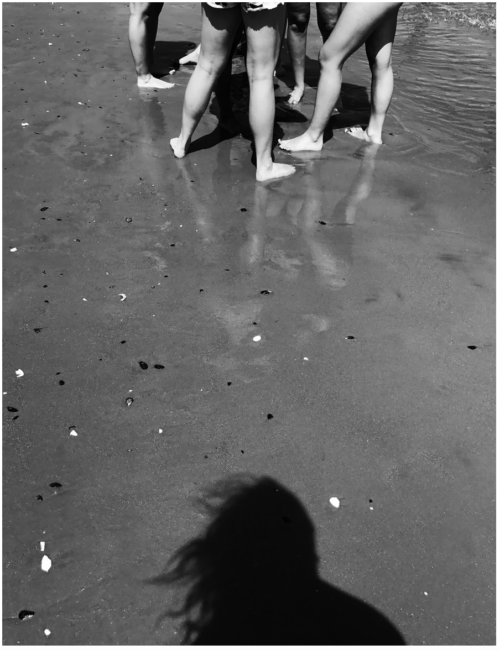
Self-portrait in Coney Island, 2017 © Erika Morillo
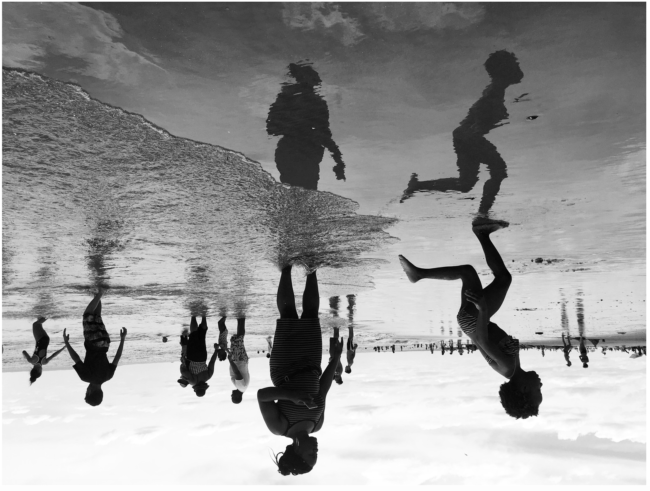
Mirage, 2016 © Erika Morillo
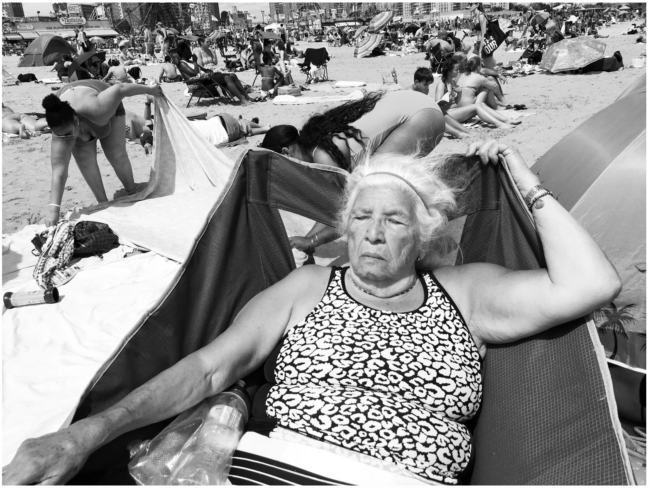
Sunbathing, 2017 © Erika Morillo
This experience led Erika to an immediate connection to explore and do more street photography. “I was inspired by the tradition of street photography in the city. There are so many great photographers to provide inspiration… Bruce Davidson, Garry Winogrand, Bruce Gilden, Helen Levitt… all these people really inspired my image making. Ultimately it became a way for me to be present in the moment, be present in my motherhood, my life, and my experience of my life in the city as an immigrant.”
The images in Coney Island, as well as her other projects such as Umbral, and Vestigios contain a balance of joy and painful remembrance – a bittersweet balance portraying the experiencing of life. Images of children and families become representations of all families. The universal experience becomes personal through the eyes of the viewer, and Erika doesn’t shy away from exploring painful memories for herself, such as the loss of her father at an early age. Her images also strongly evoke a sense of taking in the joy of living and being in the moment. “In all of my work, there needs to be a balance. While working on these projects that are family related, it tends to be really heavy… it’s work I struggle with sometimes because I want to talk about these things but I don’t want to go through the process of remembering these things that are hurtful… so being able to make joyful images (like in Coney Island) comes from a very visceral, immediate, very joyous place… and it’s like a kind of cleansing. That is important in my practice.”
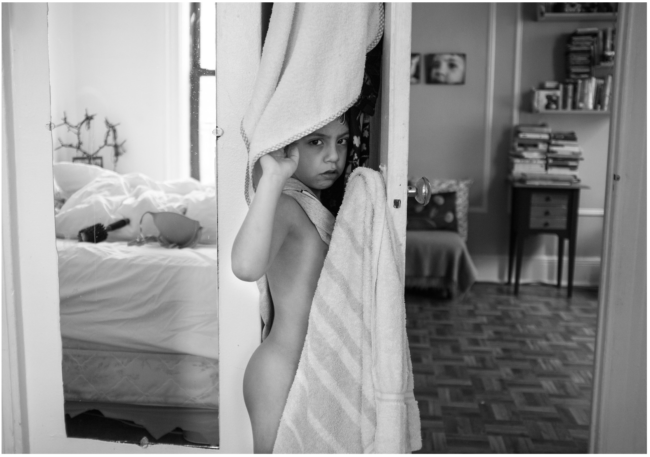
Hideout, 2014 © Erika Morillo
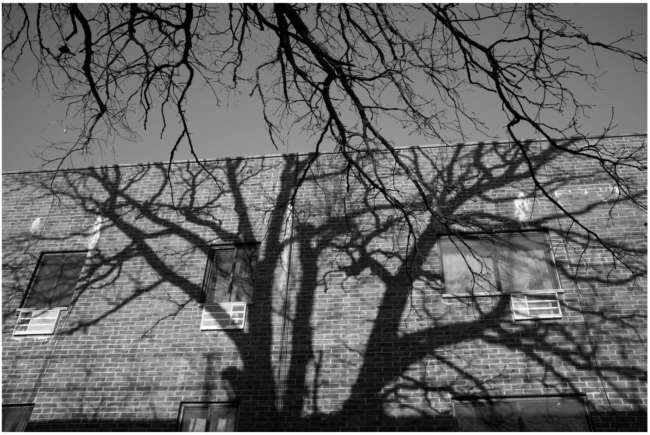
Genealogy, 2013 © Erika Morillo
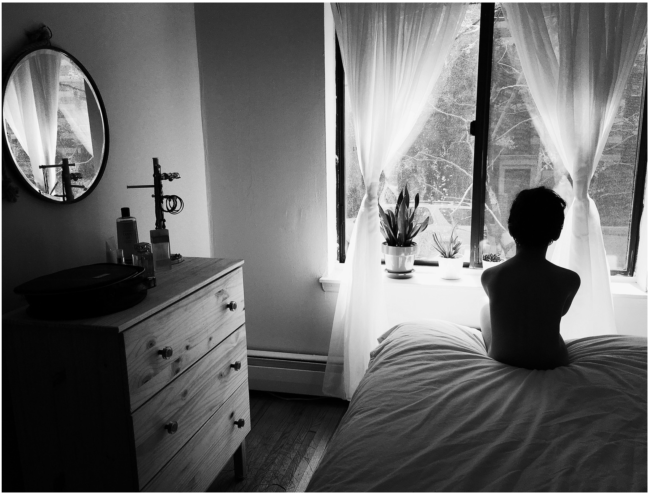
Amaru in my room, 2016 © Erika Morillo
Erika’s practice also includes her role as an educator. She has held workshops at the Center for Book Arts, and taught students about the art of making photo books. So many choices go into how to present one’s work, and why. Aside from paper choices, cover choices, gate folds, French folds, etc… “Knowing how to approach work, how to grow and how to deal with unknowns is important. When you’re faced with a set of images, and you don’t know what they are ‘telling’ you, or you’re looking to make a photo book without an angle or knowing what you’re trying to say… if you are not faced with that question often enough, there isn’t growth – because you’re operating from what you already know about yourself. In photography, and especially with photo books, you are given the opportunity to crystallize your intention and find out what you want to say.” Erika also spoke about working with others and getting their input on how to edit, and to find one’s voice is critical. “From working on the book for Umbral, and discovering how my son’s childhood reflected my own childhood and my own fears… I found out what I wanted to actually wanted to say… I wanted to capture the space in-between his childhood and being a teenager. When you are faced with those questions of finding the story, the angle, and facing those conundrums… that is where the the real growth happens.”
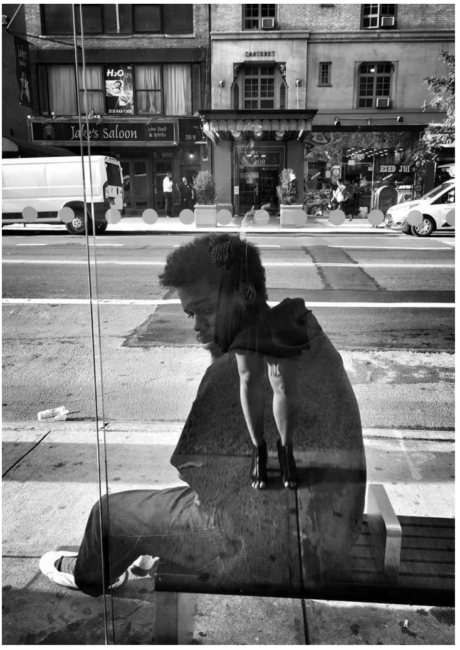
Self-portrait at bus stop, 2017 © Erika Morillo
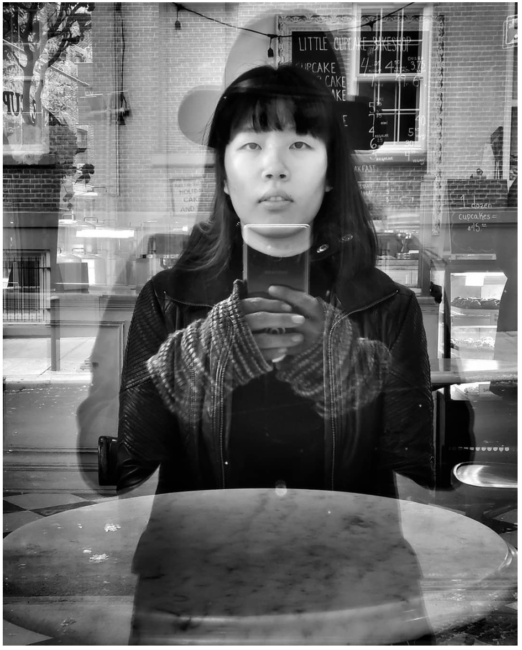
Self-portrait with woman, 2018 © Erika Morillo
In the statement for Umbral, Erika chooses to speak about her experience, about her son’s experience in very direct, approachable way. The same goes for Coney Island’s statement. I appreciate an artist who writes with the intent on reaching the viewer/reader without hitting them over the head with ‘art-speak’ or overly coded or covert language. Morillo’s project statement opens with the confession that she will always fall short of being able to explain her love for Coney Island, but she proceeds to describe what it means to her in understated prose and images. I was drawn to explore her images after reading about the project.
Throughout her work, there is thoughtful intent, and she employs traditional compositional techniques in refreshing ways. Simple things like reflections, shadows, or water as a “new, separate character in the scene”, as she says, are masterfully used. The common themes throughout her work are very strong as well. A strong female perspective is woven into images which act as a registry for family, loss, joy, pain, memory.. and reflect her need to collect and cherish these feelings; and serve as resistance to forgetting.
Erika Morillo was born and raised in the Dominican Republic, and is a freelance photographer and artist based in New York City. She studied clinical psychology and sociology, which influenced her to photograph as a way to understand her family dynamics and the social environment she inhabits. Her work focuses on the issues of family, inner-city life and the finding of identity. Her photographs have been published and exhibited nationally and internationally. Her photobooks are in the collections at the Whitney Museum of American Art Library and The International Center of Photography Library.
Morillo is currently working on a new project, Motherland, which explores her relationship with her mother. To learn more, visit her website at https://www.erikamorillo.com
Location: Online Type: Featured Photographer, Interview
Events by Location
Post Categories
Tags
- Abstract
- Alternative process
- Architecture
- Artist Talk
- artistic residency
- Biennial
- Black and White
- Book Fair
- Car culture
- Charity
- Childhood
- Children
- Cities
- Collaboration
- Community
- Cyanotype
- Documentary
- Environment
- Event
- Exhibition
- Faith
- Family
- Fashion
- Festival
- Film Review
- Food
- Friendship
- FStop20th
- Gender
- Gun Culture
- Habitat
- Hom
- home
- journal
- Landscapes
- Lecture
- Love
- Masculinity
- Mental Health
- Migration
- Museums
- Music
- Nature
- Night
- nuclear
- p
- photographic residency
- Photomontage
- Plants
- Podcast
- Portraits
- Prairies
- Religion
- River
- Still Life
- Street Photography
- Tourism
- UFO
- Water
- Zine

Leave a Reply